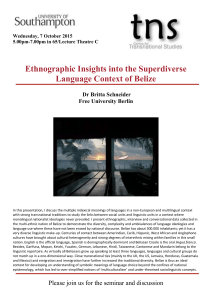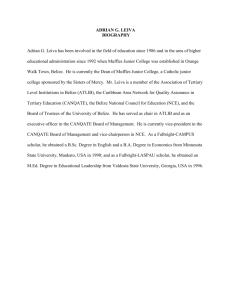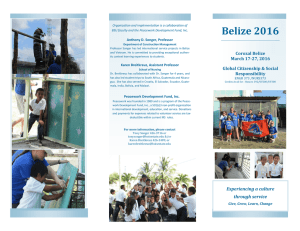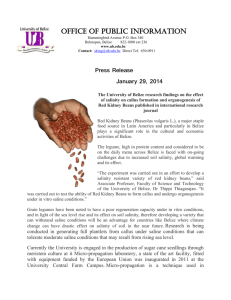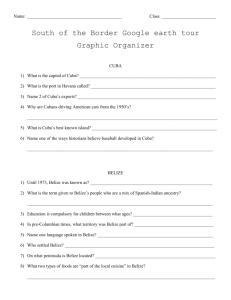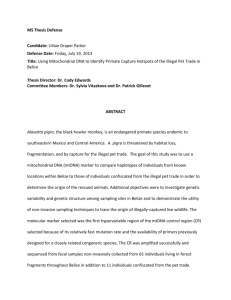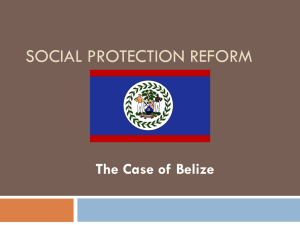W T O
advertisement
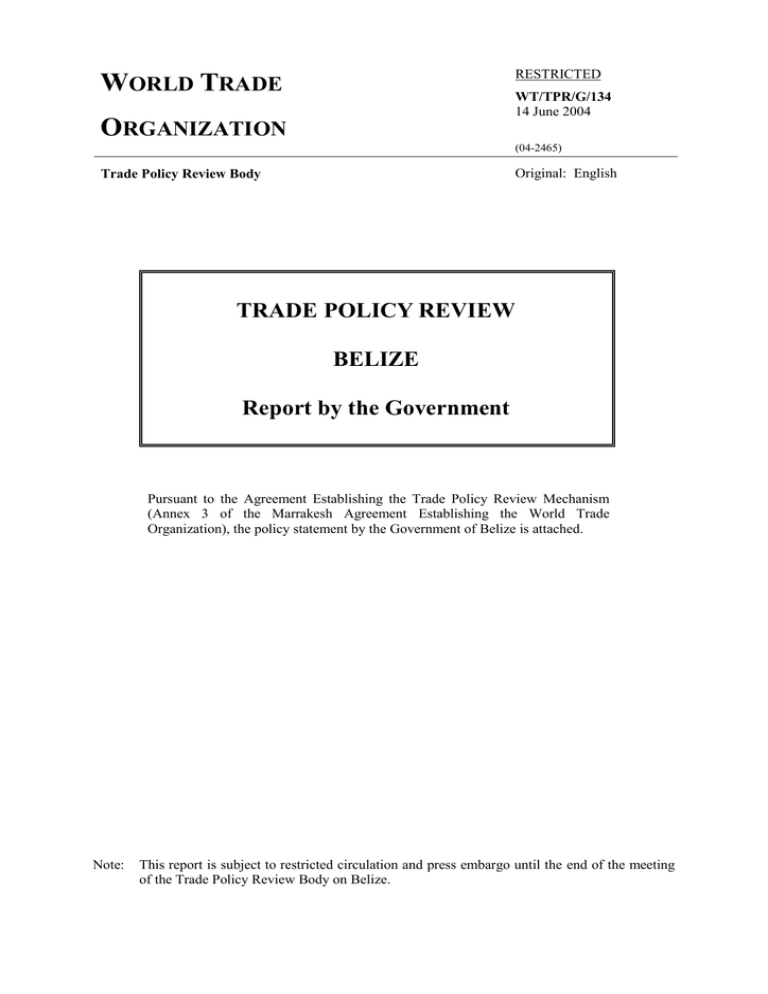
RESTRICTED WORLD TRADE WT/TPR/G/134 14 June 2004 ORGANIZATION (04-2465) Original: English Trade Policy Review Body TRADE POLICY REVIEW BELIZE Report by the Government Pursuant to the Agreement Establishing the Trade Policy Review Mechanism (Annex 3 of the Marrakesh Agreement Establishing the World Trade Organization), the policy statement by the Government of Belize is attached. Note: This report is subject to restricted circulation and press embargo until the end of the meeting of the Trade Policy Review Body on Belize. Belize WT/TPR/G/134 Page 3 CONTENTS Page I. INTRODUCTION 5 II. TRADE POLICY FORMULATION 6 III. MACROECONOMIC CONTEXT 7 (1) EXTERNAL TRADE 8 (2) POLICY STRATEGY 8 IV. KEY SECTORS 8 (1) AGRICULTURE 8 (2) QUANTITATIVE RESTRICTIONS 9 (3) FISHERIES 10 (4) SERVICES 10 (5) TOURISM 10 (6) FINANCIAL SERVICES 11 V. INVESTMENT DEVELOPMENT STRATEGIES 11 VI. REGIONAL DEVELOPMENTS 11 VII. INTERNATIONAL TRADE NEGOTIATIONS 12 VIII. CONCLUSION 12 Belize I. WT/TPR/G/134 Page 5 INTRODUCTION1 1. Belize borders the Caribbean Sea, between Guatemala and Mexico at geographic coordinates: 17 15 N, 88 45 W, with a land and water area of 22,966 sq km and a population of 273,000 2 inhabitants. Though geographically located in Central America and sharing borders with Mexico and Guatemala, to the North and West respectively, Belize has historically established closer ties economically, politically and culturally with its Caribbean counterparts. It is also geographically distinct from most of its Caricom counterparts because it is one of the three members that is not an island state. 2. Belize is the only English speaking country in Central America, achieving its independence from Great Britain on 21st September 1981. The government of Belize is a Parliamentary Democracy with Her Majesty Elizabeth II, the Queen of England as the titular Head of State, represented by the Governor General. Belize's Constitution provides for a three-way balance of power between the Executive, the Legislative and the Judicial branches of Government. 3. Given Belize’s geographic location, it is highly susceptible to natural disasters and environmental damage. It has been noted that the prevalence of natural disasters and the resulting impact in terms of per capita costs and per unit of area damage is often much more devastating on small economies than in a large one. During the three year period, 1999-2001, Belize’s economic performance was impacted by Hurricane Keith, Tropical Storm Chantal, and Hurricane Iris. As a result of these storms, Belize suffered $857.7mn in losses and damages. Hurricane Mitch, while it did not hit Belize directly, caused a loss in the economy of some $20mn due to uncollected revenue and temporary economic paralysis. 4. Belize’s ethnically diverse population remains extremely dispersed with about twelve inhabitants per square kilometer. This dispersion of a small population over a relatively large land mass increases the cost of the delivery of goods and services including by the public sector making the latter very expensive. In fact, one of the more underdeveloped areas in Belize is the southern part of the country which is characterized by relatively poor infrastructure making accessibility to some areas extremely difficult and expensive. The result has been notable under-development compared to other more centralized locations. 5. Because of varying challenges, Belize has not attracted large-scale industries for the production of goods subject to economies of scale at competitive prices. As a result, exports remain highly concentrated on traditional products such as citrus, banana and sugar that are sold in preferential markets. However, the system of preferential arrangements is threatened by preference erosion such as through the EU’s Everything But Arms Initiative in favour of least-developed countries, internal reform in the preference-giving countries and legal challenges in the WTO. This dependence on a few export products and a few markets indicate that even small changes in the international price of commodities have a big impact on the domestic economy. 6. Cognizant of the erosion of the preferential treatment, and working within the remit of its options, Belize has undertaken sustained efforts at export diversification. Diversification has had relative success for large farmers but not for small farmers. Diversification into niche products is one of the strategies that should contribute to the sustainability of small farmers in Belize, given the present trends in globalization and trade liberalization. These products represent niche markets that largely are not of interest to the big multi-nationals due to their small size relative to other product lines. Being small limits the possibilities of fully diversifying the export base and lack of export 1 2 All figures are in Belize dollars unless otherwise indicated. Source: Mid-Year population estimates for 2002, Central Statistical Office (CSO). WT/TPR/G/134 Page 6 Trade Policy Review diversification is clearly a disadvantage as it makes Belize more vulnerable to changes in demand or in the prices of the few commodities and services we export. 7. The sugar, citrus and banana industries play an invaluable role in the socio-economic growth and stability of Belize. The sudden and dramatic erosion of trade preferences is therefore very alarming to Belize because of the mono-crop nature of our economic profile. 8. Though Belize’s economy has more recently shown signs of a gradual transformation from an economy that is primarily agriculture to one that is more service-oriented, Belize is still fundamentally an agro-based economy. For Belize, the agriculture/agri-business and tourism have been the twin engines of growth for the past years. However, the performance of these key sectors is largely determined by foreign market conditions which expose Belize to economic volatility. Finally, because Belize’s share of world trade is relatively small, Belize cannot determine its own terms of trade, reinforcing the vulnerable nature of a small economy. 9. It is acknowledged that differences in size determine differences in the economic structure and social and administrative organization which in turn has implications for the fiscal structure. Belize is an archetypical small economy that demonstrates such structural features as openness, dependence on trade, and a large and chronic trade deficit. A significant proportion of fiscal revenue is dependent on the collection of custom duties and other trade related charges. In fact, the proliferation of different taxes and duties is an unfortunate result of the implementation of regional and multilateral commitments taking into account the reality of our dependence on taxes on international trade. 10. The Government of Belize (GOB) recognizes that trade is instrumental in advancing Belize’s economic and social prosperity. In the current global political environment, it is only through greater integration into the international economy that the GOB expects to further expand Belize’s growth potential, broaden its economic base, while also ensuring that all segments of the population benefit from increased economic welfare. Cognizant of the difficulties faced by Belize in participating in the global economy, GOB underscores the principle that any integration agreement (between asymmetric parties) takes due account of the needs and weaknesses of developing countries and the vulnerabilities endemic to small developing states. 11. Belize advocates the Principle of Gradualism which mandates that small economies should be gradually integrated into the rules based international economy, paying special regard to the need for special and differential treatment to be accorded to smaller economies. II. TRADE POLICY FORMULATION 12. GOB has increasingly recognized the importance of trade as a tool for advancing Belize’s economic and social prosperity, and to that end has taken concrete measures to direct the necessary resources thereto. Currently, there is an established Ministry of Trade that deals with trade issues and trade policy formulation. However, because of scarce resources, the Ministry relies on only five junior professional economists who have responsibility for ACP-EU relations, WTO, CARICOM, CARICOM-Bilaterals, FTAA, and Belize’s Bilaterals. These economists are often required to deal with different issues and are responsible for more diffused and complex tasks than in larger countries where financial and personnel resources allow for greater separation of administrative and professional roles. The resource constraints are so severe that for Belize’s first trade policy review, there was only one junior economist available to coordinate the entire process. Notwithstanding these constraints, and with a renewed focus on trade as a potential tool for development, Belize welcomes its first trade policy review. This Trade Policy Review has proven to be an indispensable aid in Belize WT/TPR/G/134 Page 7 revisiting and drafting trade policies aimed at the sustainable development of Belize and its integration into the global economy, recognizing its special vulnerabilities as a small economy. 13. In an effort to deal with the resource constraints, a Trade Technical Team was established in 2002 comprising of core ministries such as Ministry of Agriculture, Fisheries and Cooperatives, Ministry of Natural Resources, Environment and Industries, Ministry of Finance, Ministry of Foreign Affairs, and Ministry of Economic Development. This team serves as the technical support to the Ministry of Foreign Trade and the NTNC. As well, in June 2003, Cabinet established the National Trade Negotiating Commission (NTNC) which was fulfilling its commitment to “creating a tripartite commission of Government, Civil Society and the Private Sector to negotiate trade agreements and to devise policies to cope with the effects of globalization.” The NTNC, which is co-chaired by the public and private sector, meets quarterly and provides advice to Government as well as assists in the development of trade positions and policies for Belize. 14. Belize is a non-resident WTO Member. Because of the need to stretch scarce professional resources, Belize’s Mission accredited to the WTO does not have any experts. This certainly has negative implications for its integration into the multilateral trading system and problems are compounded by its inability to effectively participate in the multifaceted WTO processes and to implement and administer WTO agreements effectively. Consequently, the WTO is covered professionally from our Embassy in Brussels, Belgium. III. MACROECONOMIC CONTEXT 15. During the post independence era (1980-1996) real GDP grew at an average of 5.0% as the authorities moved towards creating a more open and vibrant economy. However, independence occurred around a time when there was a severe deterioration in the terms of trade caused by a fall in export earnings reflecting a decline in world prices. As a result, in 1984, the country entered into a standby agreement aimed at restoring macroeconomic stability and growth. 16. The consolidation of preferential trade agreements between Belize and the European Union, the United States, CARICOM and Canada set the stage for a remarkable economic boom in the background of the stabilization programme. The recovery also resulted from private sector investment in key agricultural industries and housing and tourism-related construction. High priority was also given to fiscal restraint, characterized by improvements in tax collections and reductions in current expenditure. 17. Real GDP growth remained high during 1998 to 2002, averaging a remarkable 7.2%. But the economic expansion was accompanied by a notable decline in domestic savings and an increase in external borrowing. This raised concerns about the country’s economic vulnerability and the ability to withstand the impact of external shocks. Government decided on a series of adjustment measures such as reforms aimed at opening the economy and enhancing private sector participation. This included trade policies to ease import and export licensing requirements, price liberalization and streamlining of the investment incentive system. In addition, the Government continued with its privatization program to reduce government’s role in the provision of some services. To date, Belize has completed the privatization of the telecommunications, electricity, water services, airport and port authority sectors and the printery. 18. The most recent data indicates that general economic activity has been respectable with GDP growth being recorded at 4.3% in 2002. This increase was driven by substantial gains in the tourism and tourism-related sub-sector and increased output from agriculture, fisheries and forestry activities WT/TPR/G/134 Page 8 Trade Policy Review as these sectors recovered from the negative effects of hurricanes, a shrimp virus epidemic and the terrorist attack on the United States. (1) EXTERNAL TRADE 19. As a small developing country, Belize relies heavily on foreign trade, and particularly on imports to fuel economic expansion and activity, resulting in an increasingly large trade deficit. In 1994, the deficit stood at Bz $160.8mn. In 2002, it had more than doubled to reach a total of Bz $376.5mn. Over the period, imports have maintained a value of over 65% of the GDP and exports over 35% during the same period. Currently, Belize’s major export markets are the United States and the United Kingdom. In 2002, these two destinations accounted for more than three-quarters of the export market. 20. In terms of exports, Belize’s economy is largely dependent on a few commodities: sugar, citrus, and banana. However, in the past few years tourism and shrimp farming have begun to contribute significantly to export revenues. In 2002, these five industries accounted for approximately three-quarters of Belize’s export earnings. (2) POLICY STRATEGY 21. Belize’s economic strategy aims at strengthening its foreign reserve position and consolidating the fiscal accounts; boosting economic growth through continued investment in infrastructure and promoting sustainable social and economic development. Rural poverty will continue to be addressed through the promotion of small-scale agricultural development and the implementation of rural community-based projects to improve social infrastructure in the villages. Through the formulation of appropriate trade and investment polices, government also seeks to enhance the role of the private sector in the new global environment. IV. KEY SECTORS (1) AGRICULTURE 22. Agriculture is a way of life and the means to sustainable livelihood and employment which are essential to human development. Therefore, GOB has appropriately designated agriculture/agribusiness as one of the main engines of growth for Belize’s economy. Agriculture continues to form the foundation of the productive sector and the rural economy of Belize. It is a major source of foreign exchange earnings and supplies incomes, basic foods and subsistence livelihoods for a significant portion of the population. At least 35.0% of GDP and 41.0% of total employment is directly dependent on agriculture, fisheries and forestry. In addition, 90.0% of all manufacturing is based on input from or for the primary sectors of agriculture, fisheries, and forestry. 23. Belize’s export trade is dominated by agricultural exports, particularly the traditional products, sugar, bananas, citrus and in recent years, marine products. In 2002, agricultural exports accounted for 68.2%3 of total domestic exports. Traditional crops represented 84.5% of total agricultural exports and 57.6% of total domestic exports while non-traditional exports (papayas, peanuts, black eye peas, cocoa beans, honey, chicle, and pepper products) accounted for 15.5% of total agricultural exports. In 2002, marine products represented 21.0% of total domestic exports, more than doubling since 1994. 3 Belize Central Bank data. Belize (2) WT/TPR/G/134 Page 9 QUANTITATIVE RESTRICTIONS 24. Belize maintains import licensing for certain selected agricultural products primarily as a monitoring mechanism to check the excessive smuggling which shows signs of increasing, given the extensive contiguous border with Mexico and Guatemala. In addition, as a micro-state, Belize lacks the administrative and financial capacity to resort to traditional trade remedies to protect its domestic base when there are disturbances on world markets which have effects on employment or prices and in turn can have negative effects on food security and human development. 25. The banana, citrus and sugar industries, small by international standards, contribute significantly to the socio-economic stability of Belize. For Belize the gains from trade have been suboptimal partly because of falling commodity prices and specialization in exports with low value added. 26. Through a deliberate initiative to eradicate poverty in the more poverty stricken areas in Belize, both the banana and citrus industries are located in the south of the country, while cane growing was encouraged in the north. Both sugar and citrus are characterized by heavy subsistence farming, increasing the vulnerability of these farmers to external shocks in the global economy. 27. As a beneficiary under the CBI, Belize exports 70% of its Frozen Concentrate Orange Juice to the US. Citrus and citrus products account for 21 percent of export earnings and contributed an average of 6 percent to GDP over the last ten years which makes this industry the second largest income generator and foreign exchange earner.4 As such, the industry plays an important role in generating employment and providing sustainable rural livelihood for the southern area. Approximately 1,300 persons are directly employed and more than 2,000 people are seasonally employed. Many small growers have been forced to exit the industry, as a direct result of declining incomes received within the last five years. In 2002, production declined due to damages caused to the groves by Hurricane Iris. It is expected that as the US increasingly liberalizes trade, the industry will encounter additional difficulties in competing against large citrus producers that benefit from subsidies. 28. Banana exports ranked as the fourth largest export earner for the country in 2002. In October 2001, Hurricane Iris completely damaged 85% of the banana industry. However, 2003 banana production figures reflected a remarkable recovery, reaffirming the industry’s resilience and importance in the Belizean economy. The industry generates approximately 3,000 jobs directly and some 9,000 jobs indirectly and at least twelve communities in Southern Belize depend directly on the banana industry. 29. Belize as an ACP producer, exports bananas under the EU Banana Regime known as the Tariff Quota Regime duty- free within an ACP Quota of 750,000 MT. This system stipulates that all bananas entering the EU have a license which is issued quarterly by the EU and are issued principally to importers who meet the criteria of being an importer of bananas during the reference period of 1994 to 1996. As importation of Belizean bananas into the EU market was handled through Fyffes, no licenses were issued to Belizean exporters. As a consequence thereof, Belize exporters must purchase licenses at a significant cost in order to export total production which substantially impacts the rate of return to growers. With the move to the Phase II, tariff only regime, it is hoped that Belize will be provided an opportunity for the first time, to have a say in the marketing of its fruit which would ensure a viable and sustainable future. 4 Cuellar, L. “Florida Citrus Mutual Paper”. WT/TPR/G/134 Page 10 Trade Policy Review 30. Sugar cultivation is concentrated in the Corozal and Orange Walk districts of northern Belize. Presently, there are 8,553 cane farmers, the majority of whom are considered small farmers holding less than 25 acres. Additionally, approximately 2000 more people are employed directly in various other activities related to the industry. Sugar earnings contributed an average of 21.4% to total export earnings over the last six years. The EU, United States and CARICOM are the major export markets under which Belize enjoys preferential access for sugar. The recent challenge mounted against the EU Sugar regime, by Brazil, Thailand and Australia will have a direct impact on the sugar industry and by extension the Belizean economy. Belize has embarked on a process of industrial reform and is firmly committed to increasing its competitiveness in the sugar market and preserving the socioeconomic benefits derived from the industry. (3) FISHERIES 31. The fisheries sector is growing in its importance to Belize. In 2002, the marine sector represented approximately 4.0% of the country’s GDP and was responsible for 1.5% of the employed labour force. Shrimp farming has significantly contributed to this sector making it one of the fastest growing industries in Belize. It has significantly increased foreign exchange earnings and has elevated the position of the Fisheries Sector from the fifth to the third position in 2001-2002 as a foreign exchange earner. In the past few years, the global market has been characterized by oversupply leading to weakening price levels for farmed shrimp. Belize exports shrimps mainly to the US market and a tiny portion to the Mexican market. However, relative smallness of the industry is an impediment to development since it is more difficult to absorb price shocks, or other negative unpredictable market changes than would large scale producers. (4) SERVICES 32. Belize’s services sector is another dynamic contributor to the economy. Services represent the biggest sector in the Belizean economy and account for about 59.0% of GDP. It is responsible for 60.0% of the employed labour force. The sector is the country’s single largest foreign exchange earner. (5) TOURISM 33. The tourism industry is relatively young and in 1990, the Government made the first real attempt to focus on tourism. Tourism, along with agriculture has been designated an engine of growth, contributing 18.0% of Belize’s GDP and responsible for one in every four jobs in the labour force, directly, indirectly or induced. Over the past few years, it has become the largest foreign exchange earner in the country. 34. In 1998, the face of tourism was changed with the revamping of the Belize Tourism Board’s structure and mission. The Board adopted a ten year strategic plan titled the “Black Stone Report” as the work-plan for the industry. This plan focused on a sustainable tourism development policy. 35. In the light of ensuring the sustainability of the tourism industry, the Belize Tourism Board has drafted legislations to regulate different sectors of the industry. These include operator legislation, tour guide legislation, Hotel and Tourist Accommodations Act, Minimum standards Act and most recent the Cruise Ship Policy. The emerging needs of this sector will continue to be assessed and regulations updated to address current climate. 36. The reliance of the economy on the tourism sector continues to grow as the agricultural sector faces additional hardships on the world market. Realizing this, the current tourism policy is geared Belize WT/TPR/G/134 Page 11 towards not only survival in the new global market place, but to become a leader in this new environment. (6) FINANCIAL SERVICES 37. The financial services sector in Belize is underdeveloped when compared to its Caribbean counterparts although GOB has identified this area as a possible source for diversification. 38. Notwithstanding the size of this sector, government has demonstrated its commitment to high regulatory standards and has taken the necessary action to meet internationally accepted standards in order to mitigate the occurrences of illegal activity, tax evasion, tax crime and money laundering. 39. Belize as a member of the Caribbean Financial Action Task Force was reviewed in 2002 and the review highlighted problems with some implementation measures. As a result, the Authorities enacted the following measures: V. (a) The International Financial Services Practitioner’s Code (Code of Conduct) Regulation 2001 was amended to control the mobilization of Bearer Shares. (b) The Money Laundering (Prevention) Act was amended to include accounting, legal and international services as financial institutions for the purpose of proper due diligence, record keeping, identifying and reporting suspicious reports. (c) The Money Laundering (Prevention) Act was amended to define terrorism, a predicate offence listed in the Schedule of Prescribed Money Laundering Offences, (d) The Financial Intelligence Unit (FIU) was established under its specific statue. (e) The FIU was given investigative and prosecutorial powers. INVESTMENT DEVELOPMENT STRATEGIES 40. At present, small economies maintain measures in order to compensate for their inherent cost disadvantages and to attract investment. Belize is striving to move away from dependence on a few traditional exports traded under preferential arrangements by developing tourism and other services and by diversifying into export-oriented manufacturing through the use of fiscal incentives and other investment measures which have to be phased out under current WTO rules. 41. Belize maintains three programmes that involve duty and tax concessions. These are defined in the Fiscal Incentive Act, the Export Processing Zone Act and the Commercial Free Zone Act. These programmes have as their ultimate objective, promoting investment to increase production of non-traditional crops and value-added products, to improve the manufacturing and processing activities and to create employment for Belizeans. These programmes have contributed substantially to the economic growth of the country and are partly responsible for successful development of the service sector. VI. REGIONAL DEVELOPMENTS 42. Belize became a full member of the Caribbean Community and Common Market on 1 May 1974, and as a result, Belize’s trade policies have been influenced by the provisions of the Treaty of Chaguaramas [Revised]. In 1989, the CARICOM Conference of Heads of Government agreed to establish the Caricom Single Market and Economy. In 2001, the Treaty of Chaguaramas WT/TPR/G/134 Page 12 Trade Policy Review was revised to further consolidate that initiative by broadening and deepening the integration of CARICOM member states. 43. Within CARICOM, Belize is listed as a Less Developed Country (LDC) and has been designated as one of the disadvantaged countries in the Community. Belize’s main benefits obtained from this designation are the ability to protect sensitive and vulnerable industries while also receiving financial and technical assistance to address development needs. 44. During the last decade or so, CARICOM Member States signed a number of non-reciprocal and reciprocal trade agreements with some Caribbean and Latin American countries namely, Colombia, Costa Rica, Cuba, Dominican Republic and Venezuela. In all these agreements, Belize, as an LDC does not grant market concessions while the More Developed Countries of CARICOM are expected to do so. VII. INTERNATIONAL TRADE NEGOTIATIONS 45. Belize is currently engaged in trade negotiations in a number of international fora. It is one of the 34 countries seeking to create the Free Trade Areas of the Americas (FTAA) by 2005. As part of the African, Caribbean and Pacific Group of countries (ACP), Belize participated in the commencement of formal negotiations between the ACP and the EU for the establishment of a new trade and economic partnership with the Europe Union to be effective 1 January 2008. Belize is also involved in multilateral negotiations in the WTO in the context of the Doha Development Agenda. 46. The conclusion of all these negotiations will have a significant impact on Belize’s trading relations. First, the new trade arrangements will increase competition for the relatively small firms which specialize in non-tradable goods and services. Secondly, the arrangements, while promising greater export opportunities for Belize, will erode the preferential market access now enjoyed by Belize under the CBI, CARIBCAN, Cotonou, and GSP arrangements. This will undoubtedly increase competition in those markets. More fundamentally, the advantages which Belize currently enjoys as a member of CARICOM will also be eroded as a result of the new negotiated arrangements. Initial trade negotiations have indicated that our major trading partners are requesting reciprocity. However, asymmetric differences must be factored into any trade agreement; reciprocity and non-discrimination principles must be linked to a country’s economic capacity. 47. Given the looming threat of marginalization, Belize has in all negotiating fora, joined other small developing economies in demanding special and differential treatment for small economies. In this regard, the Doha Ministerial decision to establish a Work Programme on the treatment of the small economies within the multilateral trade context is appropriate. The effective participation of these countries in the multilateral trading system should be a priority concern of the WTO. VIII. CONCLUSION 48. Belize remains firmly committed to the rules-based multilateral trading system and believes that it is in everyone’s interest for negotiations on the Doha Development Agenda to resume. However, Belize believes that the following tenets should govern trade rules:5 - Trade is a means to an end and not an end in itself; - Trade rules should allow for diversity in national institutions and standards; 5 Malhotra K. et al (2003). Making Global Trade Work for People, B. Ross-Larson (Ed), UNDP, Earthscan Publications Ltd, London. Belize WT/TPR/G/134 Page 13 - Countries should have the right to protect their institutions and development priorities; - No country has the right to impose its institutional preferences on others. 49. Belize firmly believes that a human development-oriented trade regime would give governments the space to design policies that embody these principles. The regime would also help developing countries build their capacity to gain from trade. Among the elements that such a regime would need to emphasize are regular human development assessments of trade agreements and issues, policy space for the coexistence of diverse development strategies and asymmetric rules for industrial and developing countries. 50. Belize thus echoes the urgent challenge for policy makers in both developing and industrial countries to ensure that the multilateral trade regime allows people to fully benefit from the potential contribution that trade can make to human development. 51. While recognizing that deeper integration in the global economy can make developing countries more vulnerable to external shocks, and that trade liberalization has resulted in deteriorating terms of trade and even immiserizing growth, it also recognizes that trade can also increase people’s economic participation by providing jobs as well as access to credit and markets for goods. To this end, Belize will continue to press for trade rules that are not only mercantilist in nature, but that regard real human development as a constant objective. __________

